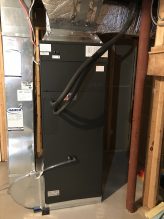Heat Pumps Can Reduce Your Climate Impact
Environment | November 15, 2022
As cold weather sets in, many will be turning on the heat in their homes and buildings to keep warm. However, furnaces and boilers, which rely on oil and gas, are costly to run and contribute to Mississauga’s total greenhouse gas emissions.
According to Natural Resources Canada – heating accounts for more than 60 per cent of the energy used in the average Canadian home.
So how can you stay warm and help the environment at the same time?
The simple answer – a heat pump.
Making the switch to energy-efficient heating equipment, like installing a high-efficiency heat pump, can save energy, reduce utility bills and lower your carbon footprint.
Heat pumps and how they work
Did you know that a heat pump can provide heating and cooling to your home?
A heat pump is a mechanical system powered by electricity that provides heating and cooling to your home. Contrary to what the name implies, heat pumps do more than just provide heat to your home. Similar to your air conditioner which moves heat in one direction (out of your home),heat pumps work the same way but move air in both directions (into and out of your home), providing year-round temperature control for your home. Heat pumps supply heat in the winter and cooling in the summer. It uses refrigerant to transfer heat from one place to another. In winter months, a heat pump pulls heat from the outdoors (even in cold temperatures) and transfers it indoors to heat your home. In warmer months, it pulls heat from the indoors and transfers it outdoors to cool your home.
Benefits of a heat pump
Since heat pumps run on electricity, they have less of an impact on our environment, creating fewer harmful emissions compared to natural gas systems. An analysis found that widespread adoption of heat pumps in Mississauga by 2050 could reduce city-wide greenhouse gas (GHG) emissions by more than 25 per cent. This could result in more than 2 million metric tonnes of GHG emission reductions which would be the same as taking more than 400,000 gas-powered vehicles off the road. Adoption of heat pumps would also result in significant air quality improvements including nitrogen oxide reductions of more than 1 million metric tonnes.
In addition, heat pumps are much more efficient than furnaces and boilers. In some cases, heat pumps can provide about three times the heating capability compared to a furnace using less energy.
While the upfront costs to install a heat pump can be higher, they can be recouped through energy cost savings over the lifetime of the equipment.
Switching to a heat pump
While you may be a little weary of switching your entire heating and cooling system over to electric – a hybrid heating system (sometimes called a dual fuel system) is also available. Hybrid heating systems look the same as conventional furnace-air conditioning systems. However, in a hybrid system the air conditioner unit is “upgraded” to a heat pump. The heat pump would do all of the cooling and would provide most of the heating for your home. The heat pump would be used for heating in milder outdoor conditions, and/or during off-peak time-of-use, when it is more efficient and cost-effective than a furnace. In Mississauga, this can result in lower utility costs and significantly lower carbon emissions.
The best time to switch to a heat pump is when your existing air conditioner is at the end of its life cycle.
As part of the Climate Change Action Plan, the City is working with partners to provide residents with opportunities to retrofit their building or homes with low carbon and resilient technologies. Toronto and Region Conservation Authority (TRCA), through funding from the Climate Impact Fund has developed a pilot program to provide a $2,000 incentive to a small number of homeowners in Peel who are looking to replace their air conditioner with a hybrid heat pump. For more information on heat pumps and to apply to TRCA’s incentive program, visit trca.ca/conservation/sustainable-neighbourhoods/heat-pump-incentive/. Installation of a high efficiency heat pumps may also be eligible for the Canada Greener Homes Grant.
Not ready to switch to a heat pump yet? Check out these resources. There are other actions you can take to help reduce your energy demand from your home, save money and reduce greenhouse gas emissions. Consider:
- Using a smart thermostat and monitor your energy consumption to understand how you can change your habits to save energy and money.
- Adding a sweater instead of turning up the heat the next time you are feeling a bit chilly.
- Weather stripping windows and adding a door sweep.
- Doing the dishes and washing clothes in the evening instead of during high energy demand periods. You can also hang your clothes to dry instead of using the dryer.
- Using the City’s online carbon footprint calculator to determine your carbon footprint, where your carbon emissions come from and what impact they have on the environment.
For more information about the City’s Climate Change Action Plan, visit mississauga.ca/publication/climate-change-action-plan/
Interested in learning more about heat pumps? Check out these resources:
- The Clean Air Alliance recently published an analysis of the financial and climate benefits of Electrifying Ontario’s Gas Heated Homes by installing an air source heat pump. Check out their online and downloadable calculators to help you understand how you could financially benefit from switching to a heat pump.
- Learn about real life examples of how heat pumps can work for you by reading case studies from homes in the Greater Toronto and Hamilton Area developed by TRCA.
Tags
Media contact
City of Mississauga Media Relations
media@mississauga.ca
905-615-3200, ext. 5232
TTY: 905-896-5151

